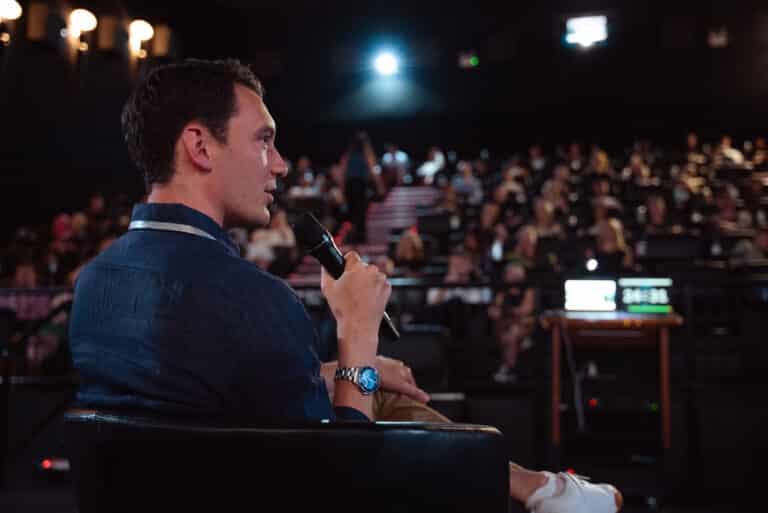Day two of Northern Marketing Festival saw the festival head to Leeds for another day filled with marketing insights from industry leaders at the likes of Bettys and Taylors of Harrogate, Embryo, McCann Worldgroup and more.
Following a welcome from David Prior, editor at Prolific North, at VUE Cinema, the event kicked off with a dedicated session with McCann Worldgroup.
Strategy directors James Bagan and Miles William took to the stage with an overview of advertising to unpack how marketers can more effectively link spend to growth and long-term success as well as the shift from brand meaning to brand impact.
With only 16% of TV ads being remembered and correctly attributed to their brands, it means 84% advertising is a waste of time. That’s a a “stark stat facing the industry”, urged James Bagan.
Despite this, the advertising industry continues to judge and measure its success on subjectivity and creative. With an overview of the transition from brand output to brand outcome, there’s often an issue with advertisers and marketers having a “short-termism” solution to issues instead of more effective long-term solution looking into data and insights.
For Miles Williams, marketers need to get back to “peak effectiveness” and a conversation needs to be had on both sides of the boardroom to define clear objectives for a brand. Marketers need to stop the “obsession” with outputs and shift the focus to outcomes and impact as it is “easy to be distracted by the art of what’s possible”.
Harriet Tuite, head of paid social at Embryo was up next to host a panel alongside Callum Leonard, head of PPC at Embryo and Simon Wild, head of marketing & membership at TOTUM on growing businesses with paid media.
On AI’s role in the rapidly evolving landscape of digital marketing, Simon Wild said AI already existed in the paid media world for “a long time” but it throws up a number of challenges, such as accuracy and its reliability.
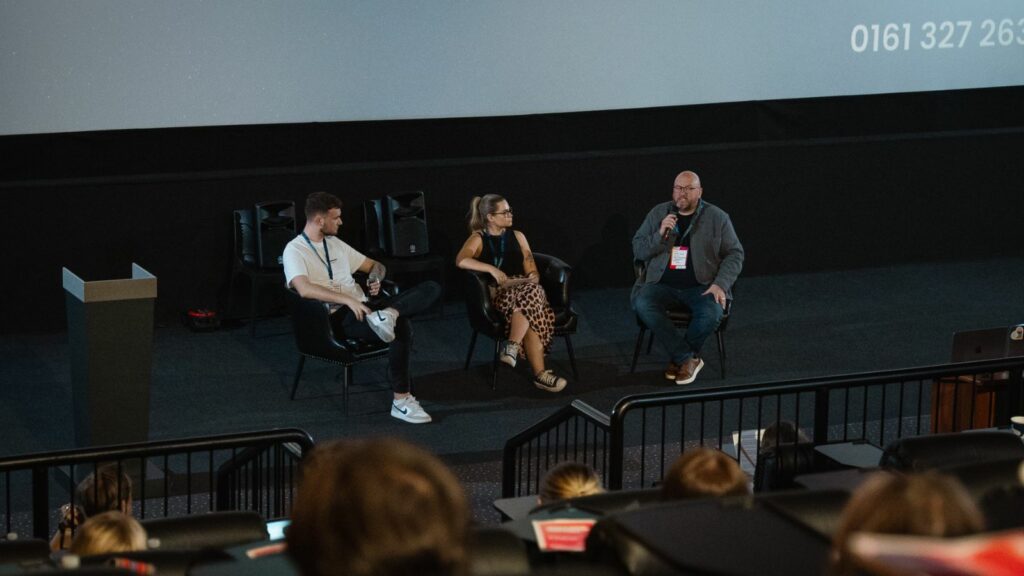
Discussing the trends in paid media that are shaping the future of performance marketing, Callum Leonard said the one thing dominating retail and ecommerce currently is quality of feeds. He said this is the year for marketers to “utilise and maximise AI to improve feeds” as it can be used to significantly reduce the length of time taken to optimise things such as titles and product categories, depending on the prompts used.
On the obstacles, he explained the issues with AI in PPC is the lack of attribution and data falloff and advised marketers to use native tracking within Google Ads and “avoid” GA4 imports.
For Wild, he has previously turned paid media off to measure the impact from the bottom line but that only lasted two weeks. He urged marketers to “not be afraid to push boundaries” and to understand what audiences want to see and when. Harriet Tuite agreed and said sometimes “nurturing the potential customer is the best thing to do” as it’s best to look at value and how each channel can work together,
It’s important to have a “test and learn approach”, added Wild, and said 10% of budget should be set aside to do this. AI offers “more opportunities” to test and learn to try new approaches and turn things off.
The panel shared a number of third party tools they recommended from POAS to Lifetimely to drive new customers through PPC. But Wild advised more budget needs to be allocated for marketers and brands to be able to experiment with those tools and agency partners should be included in those conversations.
A highly anticipated keynote session with Dom Dwight, strategy & innovation director at Bettys & Taylors of Harrogate was next up with a glimpse behind the scenes at the nation’s ‘favourite’ brew.
Reflecting back on his 16-year career at Bettys & Taylors of Harrogate, he recalled how “open-minded” the family business was when he asked to open a brand Twitter account (now X) to join in on conversations. It was an “accidental start” to the success of the brand’s presence on social media and ever since it has “grown in importance and its role has morphed over the years”.
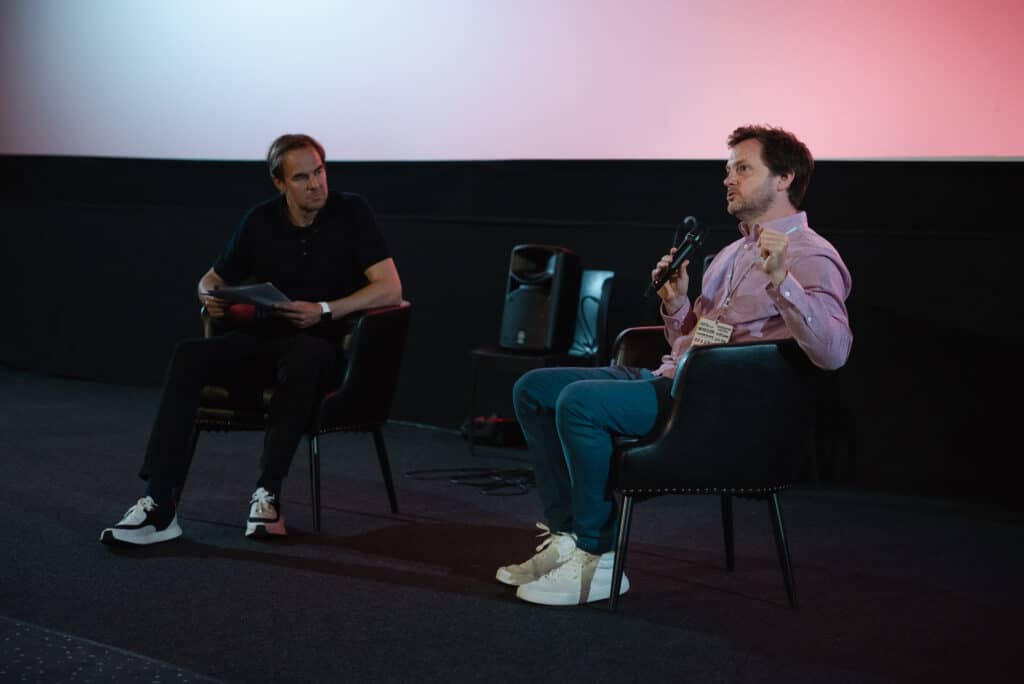
Although the company published recent sales of £300m, when Dwight first joined the company it had a much smaller share of the tea market. That has since accelerated to 40%. “It’s been quite the journey”, he said, emphasising the importance of consistent messaging, personality on social media and product quality as key reasons for the company’s growth over the years.
Around 2010-11, the ‘proper brew’ messaging developed and really helped the brand stand out. But on challenges in the tea industry, he shared the sad news that having a cup of tea is in “perpetual decline” with the tea market now 20% smaller than it was a decade ago, as consumers now have more choice when it comes to drinks – and tap water being the “biggest competitor”.
But when it comes to innovation in the tea market, the team is “rethinking how to make tea relevant” from the benefits it has to offer to tapping into the rise of the cold drinks market as potential opportunities.
For the latest tools or technological advancements, the marketing industry is “slightly obsessed” with tech such as AI. Although it should be experimented with, it is still “ages away from being usable” and shouldn’t be a focus for marketers. On channels, X often is “misunderstood” but is still useful for brands to join the conversation, reflecting on how the team was able to flip a bizarre social media storm after Rishi Sunak posted about Yorkshire Tea into a viral response from the brand – “Sue, you’re shouting at tea!”
A further fireside chat was hosted by Jon Workman, creative director at Ponderosa; Steve Henry, group growth director at Audience Collective; and Adam Irwin, strategy director at Ponderosa offering their insights into how brands can be playful and not cock it up.
Dull ads are “phenomenally costly”, said Adam Irwin, with some campaigns too busy trying to educate consumers or pumping out the same type of creative as competitors. As soon as an ad appears to look the same as your competitor, there’s “nowhere to go” as a brand and it’s far better to be memorable and “shock or excite people”.
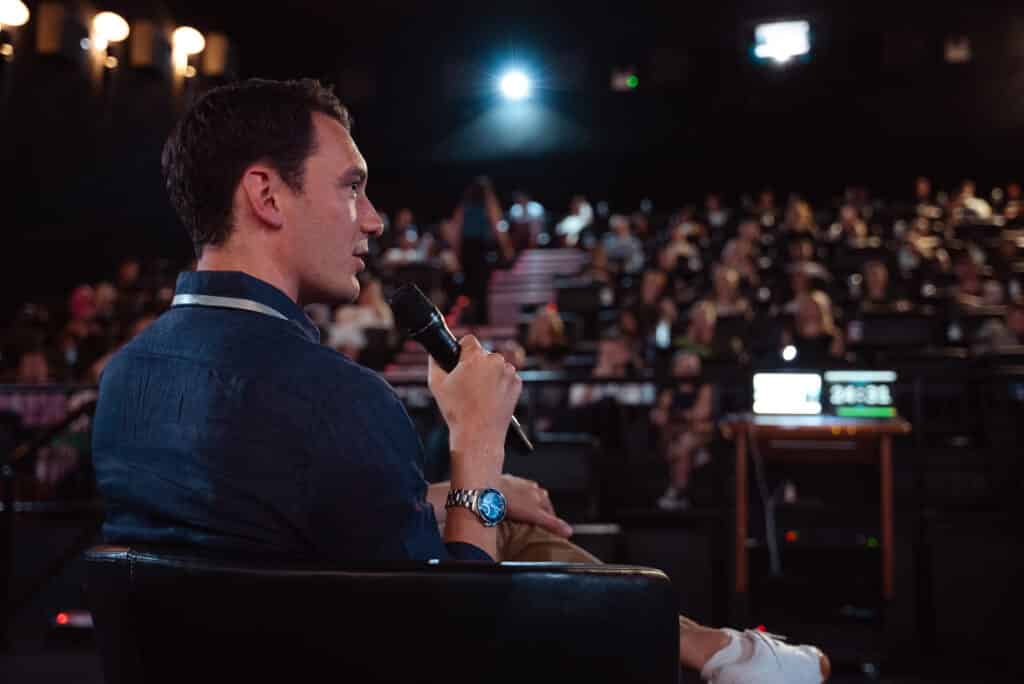
For Jon Workman, brands “should behave more playfully” such as how Paddy Power saw success with stunts and Specsavers and Surreal tapped into moments and jumped on trends. From Cadbury’s drumming gorilla to the Guinness ‘Surfer’ campaign, those “era defining ads” were from agencies that pushed forward with big, brave or scary ideas to stand out despite initial knockbacks. His advice for brands was to work with agency moments if there are to be more era defining moments in future.
On the three things to not cock it up, Steve Henry’s final words were that brands should “be worth people’s time” and “play to its proposition”, don’t undermine it and don’t give in.
Alex Culshaw, head of qualitative research at Spark Market Research, followed with a myth-busting session to showcase how research and insights can provide inspiration and confidence to push brands in new directions.
Often, market research can have a “bad reputation” and is seen as the creative death knell for some but with extensive data research, it’s not all surveys and clipboards.
Insights are the “bedrock of creativity” and offer brands and agencies a glimpse into the real world via qualitative tools such as ethnographies to observations, shop-alongs or visiting people at home. With story arcs, empathy maps or personas, these tools are shared with agencies or partners to explore and experiment with new ideas.
“If we can work better together, it’s a better benefit to everybody,” he explained.
Neil Adams, CEO & co-founder at Powerhouse, took to the stage next to delve into how to get the most out of a marketing budget with content. With demand on the rise, challenges like poorly executed content, isolated briefs, misalignment between agencies and missed reuse opportunities are all too common.
Having great strategy and creative with poor execution is a “campaign killer” and he explained how the modern approach is considering production right from the beginning. By embracing a production strategy approach, it can offer value, sustainability, consistency and quality.
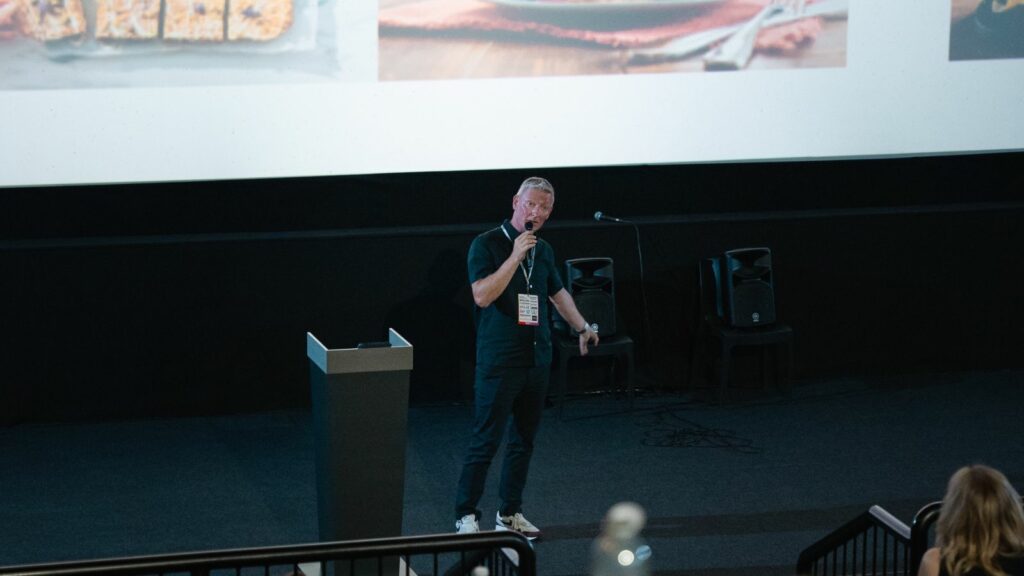
On the key takeaways for brands, he said in an ideal world it’s key to do a full content audit across a business but marketers can start small with channels such as TV and social or ecommerce and packaging by looking at the synergy of the two to see if it delivers “cost and efficiency”. His top tips were capturing stills and motion at once, reuse the best content and ask what else may be of value for social channels for instance, such as digging into the archives or look at behind the scenes content which can sometimes perform better.
We delved into the importance of technology and creativity in events next with Marc Allott, creative director at First Event and Max Collishaw, head of tech & innovation at First Event.
From using AI insights to streamline every element of your attendee experience, to creative and immersive content, the duo argued events should be about creating “moments” not just messages.
Events can be the “loudest part of a marketing campaign” and should have peaks, especially at the end, as that’s what attendees will often remember. From a grand scale at ABBA’s virtual Voyage concert by tapping into tech to create nostalgia to the ability of Taylor Swift’s concerts to drive fandom and community, smaller events can also tap into making events memorable through simplicity or experiential experiences.
The less-than-magical Willy Wonka event driven by AI was a great example of how poorly executed events can damage reputation “beyond recognition, the duo warned. AI can be used but must be in a considered way.
Danny Blackburn, chief strategy officer at KINESSO, followed with a fascinating look into the future of search with the recent explosion of GenAI, algorithmic bidding and emerging platforms.
With the search ecosystem evolving and disrupting consumer behaviours and upending established advertising strategies and business models, he provided an extensive overview of the “big journey” search is currently undergoing.
The change will be “profound for marketers” yet, according to KINESSO’s research, 73% of marketers are concerned about it. With the arrival of Generative AI, the industry is at the cusp of an AI revolution and although there hasn’t been any “seismic change yet in the search industry” there will be big changes in future.
78% of marketers surveyed by KINESSO said they were unprepared for the changes around search and he urged brands and agencies to keep on top of what’s happening as it will drive more competition with “fast, rich and well-structured sites” set to perform the best.
He advised brands and marketers to make sure content on websites is of high quality, created by genuine experts with a seamless experience. With 53% of marketers surveyed said they are not yet using search ads outside of Google, he explained how KINESSO has started to ramp up experimentation which should be “embedded in the business everyday” as with search changing, the measurement of it should too.
To wrap up the day, Prolific North’s editor David Prior exclusively revealed Prolific North’s brand new list – Top Northern Brand Marketers 2024 – you can now read the full list here.
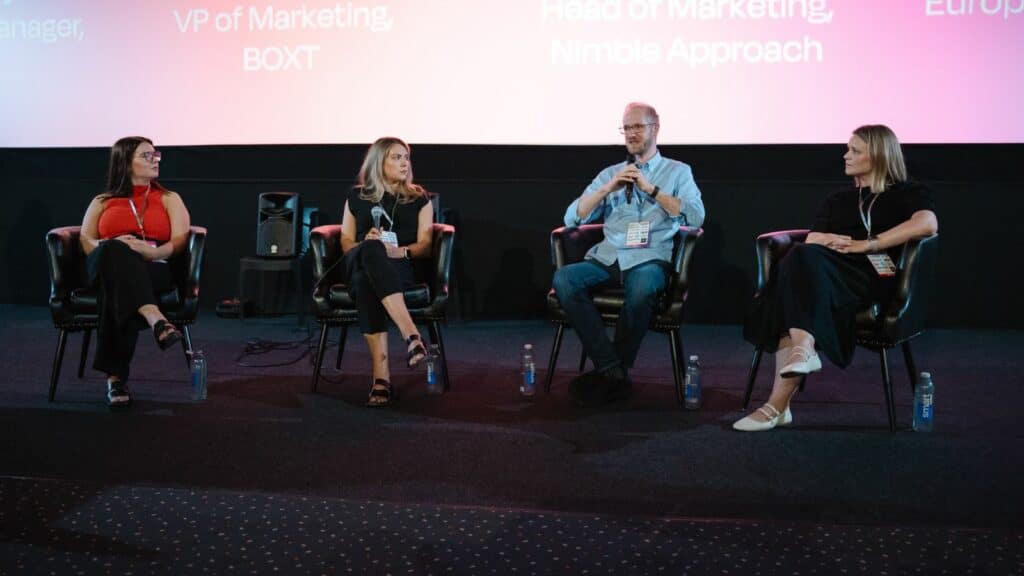
It was followed by a panel discussion with four of the leaders named on the list including Caroline Huntley, partner marketing manager at Virgin; Laura Kenny, VP of marketing at BOXT; Dan Mortimer, head of marketing at Nimble Approach; and Angela Cameron, European brand and portfolio director at Mars.
As Prior quizzed the panel on their careers and key milestones, Angela Cameron first reflected on her 20-year career journey starting out in Australia for global brand Pedigree, to moving around Europe and eventually landing in the North. A “game-changing moment” was becoming an emerging leader from a cohort of 30 marketers in the UK at the Marketing Academy last year.
For Dan Mortimer, he said his career changing moment in the industry involved starting out at an agency in Sheffield where he learnt about the industry very quickly. While working at challenger brands such as Force24 before heading to BOXT, competing against major established brands has always given Laura Kenny a “sense of achievement”.
Caroline Huntley reflected on her experience as a “boomerang Northerner” born and raised in the North East. Wanting to make it big in advertising, she was given the advice to move to London as many of the big players were still in London at the time. After moving, she landed roles at the likes of Compare The Market, which was a “great place to work for career progression”. But after joining Virgin, she eventually returned to the North to be with family and emphasised the importance of being a Northern-based marketer.
On the challenges as regional marketers, Cameron explained it’s often the mindset as she always had a fear of being overlooked coming from a smaller town in Australia. Passionate that opportunities are out there for everyone, she remarked how she was surprised by how many opportunities there are for marketers in the North and asked whether it’s a myth that there isn’t.
Huntley agreed that mindset is a “huge” challenge and often meeting like-minded marketers can be difficult if events are based down South, thanks to pricey train fares, as it can “hinder your career” if you don’t go. It’s why she’s since set up a marketing community on LinkedIn called Marketing North to try and tackle this.
One thing Kenny urged was for marketers to not keep themselves “locked away” as in-person events are great opportunities to come together, but that also means being inclusive to other regions and welcoming to people that also make the journey to the North.
The panel agreed that making more efforts to connect regionally at events and for more London-centric events to come to the North would be beneficial in tackling these challenges.
On their approach to talent as leaders, Kenny said if the value or business direction doesn’t align with the younger generation they will find alternative jobs. With a relatively young team at BOXT, she emphasised the importance of how the company nurtures them but is passionate about making sure if they do want to leave, they leave with skills to take into their next role. The team should be encouraged to take up training and learning opportunities to progress and feel appreciated.
For Huntley, she explained how junior talent can be “such a big advocate for your business” and would like to see more junior-level entry programmes for marketers at agencies. Although Mortimer has typically worked in smaller marketing teams, he explained how helping the team develop and get involved throughout the process is crucial for skills development, especially for junior staff.
Developing leaders that can make a “positive ripple on the world” is key to moving the industry forward, explained Cameron, as she is passionate about changing the industry for the better and emphasising the value of marketing.
Marketing has “never been taken as seriously as finance as a discipline”, agreed Kenny, and marketing can often be the first thing to go in a business so it’s vital for leaders to show value.
Their final words of advice for aspiring marketers in the room was to invest in themselves, utilise the networks out there by connecting with leaders they admire, and “don’t let geography be a barrier to your career path”.
Check out all the highlights from day one in Newcastle here.
Headline partner
Event partners and supporters




